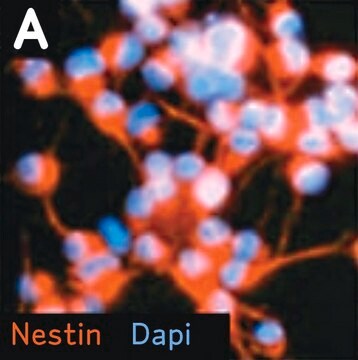Vybrat velikost
22 500,00 Kč
22 500,00 Kč
O této položce
Přeskočit na
Název produktu
Neural Stem Cell Marker Characterization Kit, The Neural Stem Cell Characterization Kit contains two molecular markers, Nestin & Sox 2 that are frequently used to identify neural stem/progenitor cells.
manufacturer/tradename
Chemicon®
technique(s)
cell culture | stem cell: suitable
immunocytochemistry: suitable
input
sample type neural stem cell(s)
shipped in
dry ice
Quality Level
1 of 4
Tato položka | SCR060 | SCR067 | SCR001 |
|---|---|---|---|
| technique(s) cell culture | stem cell: suitable, immunocytochemistry: suitable | technique(s) cell culture | stem cell: suitable, immunocytochemistry: suitable | technique(s) cell culture | stem cell: suitable, immunocytochemistry: suitable | technique(s) cell culture | stem cell: suitable, immunocytochemistry: suitable |
| manufacturer/tradename Chemicon® | manufacturer/tradename Chemicon® | manufacturer/tradename Chemicon® | manufacturer/tradename Chemicon® |
| input sample type neural stem cell(s) | input sample type neural stem cell(s) | input sample type mesenchymal stem cell(s) | input sample type: human embryonic stem cell(s) |
| shipped in dry ice | shipped in dry ice | shipped in dry ice | shipped in wet ice |
| Quality Level 100 | Quality Level 100 | Quality Level 100 | Quality Level 100 |
Application
Stem Cell Research
Disclaimer
General description
Introduction:
Neural stem cells are present in both the developing and adult nervous system of all mammals, including humans (Gage, 2000). They possess the remarkable capacity to self-renew and to differentiate along specific pathways to generate the vast array of neuronal and glial cell types of the central nervous system (CNS). Due to their therapeutic promise, considerable attention has been focused on identifying the sources of stem cells, the signals that regulate their proliferation and the specification of neural stem cells towards more differentiated cell lineages.
Presently, neural stem cells are often identified based upon the presence of molecular markers that are correlated with the stem and/or progenitor state along with the absence of a more differentiated phenotype as assessed through marker analysis. To aid researchers in the accurate identification of neural stem cells, CHEMICON® presents the Neural Stem Cell Characterization Kit (Catalog Number SCR019).
CHEMICON′s Neural Stem Cell Characterization Kit (Catalog Number SCR019) contains two molecular markers, Nestin (Lendahl, U. et al., 1990) and Sox 2 (Graham, V. et al., 2003), that are frequently used to identify neural stem/progenitor cells along with more differentiated lineage markers including Map2ab for neurons, GFAP for astrocytes and O1 for oligodendrocytes. Mouse and rabbit immunoglobulins for the assessment of background staining are also included.
All of the antibodies provided in the kit have been tested and optimized for use in immunocytochemistry on adult rat neural stem cells. We recommend that CHEMICON′s Neural Stem Cell Characterization Kit be used in conjunction with differentiation assays that demonstrate multipotentiality of the starting cell population. Please look for these differentiation assays along with rat neural stem cells from CHEMICON in the near future.
For Research Use Only; not for use in diagnostic procedure.
Other Notes
Rabbit anti-Sox 2: (Catalog No. 2003600) One vial containing 20 μg affinity purified polyclonal antibody. Store at 2° to 8°C.
Mouse anti-MAP-2: (Catalog No. MAB3418-50UG) One vial containing 50 μg monoclonal antibody. Store at 2° to 8°C.
Rabbit anti-GFAP: (Catalog No. AB5804) One vial containing 50 μL of polyclonal rabbit serum. Store at -20 °C.
Mouse anti-Oligodendrocyte marker O1: (Catalog No. 2003601) One vial containing 20 μg IgM monoclonal antibody. Store at-20 °C.
Mouse IgM: (Catalog No. 2003599) One vial containing 50 μg purified mouse IgM control antibody. Store at 2° to 8°C.
Mouse IgG: (Catalog No. PP54-100UG) One vial containing 100 μg purified mouse IgG control antibody. Store at -20 °C.
Rabbit IgG: (Catalog No. PP64-100UG) One vial containing 100 μg purified rabbit IgG antibody. Store at -20 °C.
Preparation Note
Legal Information
Skladovací třída
10 - Combustible liquids
Osvědčení o analýze (COA)
Vyhledejte osvědčení Osvědčení o analýze (COA) zadáním čísla šarže/dávky těchto produktů. Čísla šarže a dávky lze nalézt na štítku produktu za slovy „Lot“ nebo „Batch“.
Již tento produkt vlastníte?
Dokumenty související s produkty, které jste v minulosti zakoupili, byly za účelem usnadnění shromážděny ve vaší Knihovně dokumentů.
Active Filters
Náš tým vědeckých pracovníků má zkušenosti ve všech oblastech výzkumu, včetně přírodních věd, materiálových věd, chemické syntézy, chromatografie, analytiky a mnoha dalších..
Obraťte se na technický servis


